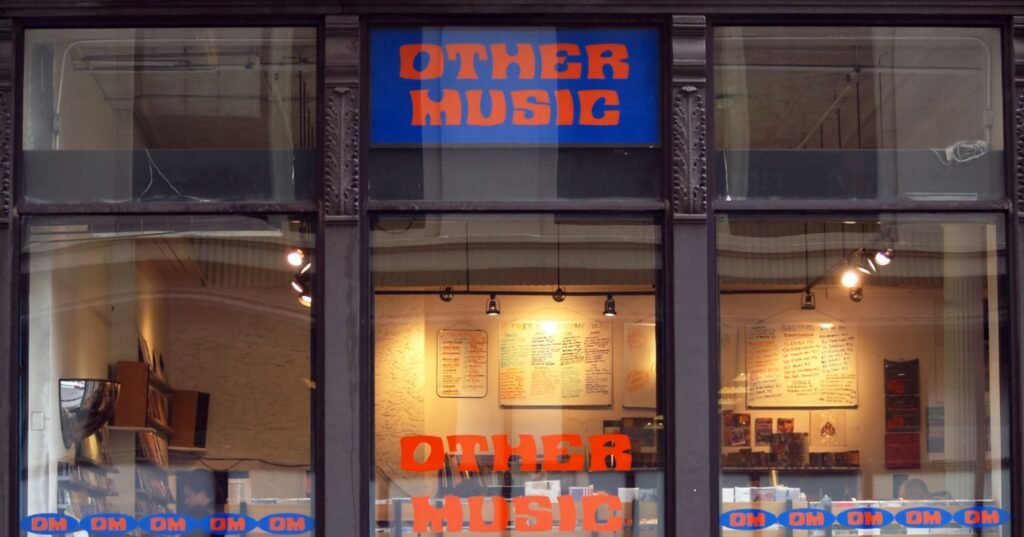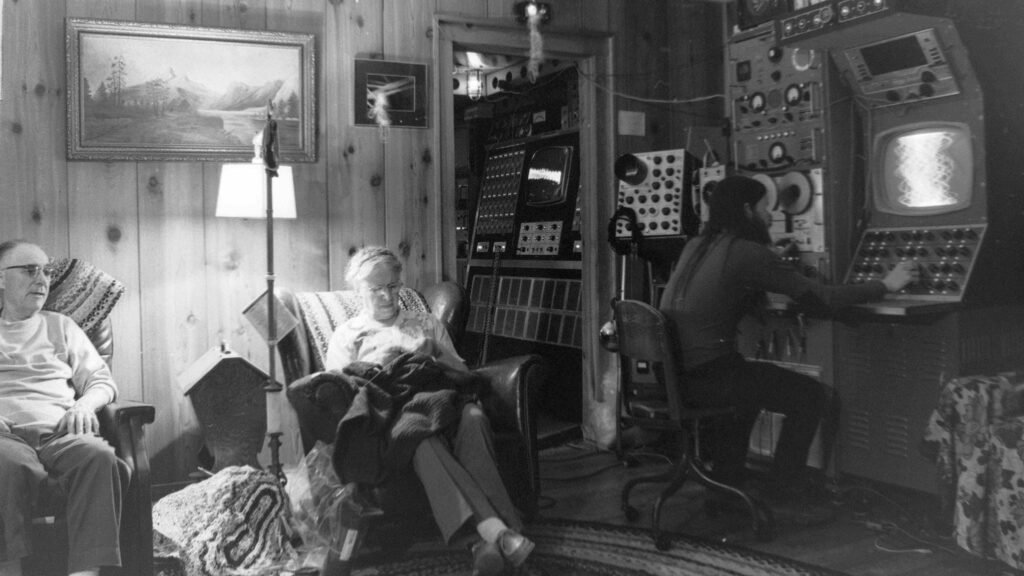The terrific documentary about Other Music popped up on Prime Video last month. I’ve wanted to see this for a while — the NYC store, much mythologized, really was the ideal of an indie record shop. It had it all: a niche selection curated by the owners and staff, records filed under sometimes-baffling genre section names, cards with reviews filled to the edges with jumbled handwriting affixed to releases, store layout and organization to the point of disorganization, and so on.
The documentary made me miss New York City (I’m so happy I got to visit a few months before The Strange Times) and, of course, browsing in record stores. But, most of all, I miss the communities and interactions that revolve around great shops. This aspect of music culture was fading, along with independent retail stores, with or without COVID interference.

Record store clerks get a bad rap for being smug jerks, judging customers’ musical tastes from behind the counter. Sure, I know a few of those —perhaps on a bad day, I’ve been one of those — but I think the cliché is overblown. As the Other Music doc shows, record store employees are often helpful experts in their chosen fields. As Caroline said as we watched the movie, “I could listen to them talk about records all day.” They know a lot about music, they listen to a lot of music, and their favorite thrill is turning someone else on to great music. People who work in record shops live for that.
There’s a moment in the documentary when a customer says to the clerk, “I’m looking for something like Lou Reed that’s not Lou Reed.” We wait for the side-glance, or a snarky response, or the indignant huff. The legends and depictions of pretentious record shops train us to believe this might be a terrible thing to ask. The customer is brave even to bring it up.
But record store staff enjoy questions like this. The request is open-ended but has a launchpad. It’s an invitation to explore, and, most of all, it’s the customer saying, “I trust you to turn me on to something I haven’t heard yet. And I’m inclined to love it.” Maybe that’s just my own experience (I owned a record store once, remember), but I think I’m right.
I can’t imagine the response if that person asked for “something like Lou Reed but not Lou Reed” on Facebook or Twitter. Maybe he’d get a handful of helpful replies in the spirit of a record shop clerk, but the snark would cover those over like a storm cloud. I don’t know of an internet equivalent of a space where one stranger can ask another for an open-ended recommendation without fear of trolls or insults or intimidation.
Record stores are places of generous expertise. It’s sad that the concept almost seems quaint in this volatile age. And that’s what I miss the most about stores like Other Music. Hopefully, these stores — Other Music not included, unfortunately — will be around once we get out of this mess. In the meantime, watch the documentary. If you ever had — or have! — a favorite record store, this movie will move you.
——————
A couple of weekends ago, 1200 record stores participated in Record Store Day. I don’t need to tell you that this was a weird edition of the annual tradition. Record store day occurs typically in April but, this time was pushed to June, as there was a thing called “wishful thinking” back then. As that plan fizzled out, we’re now celebrating RSD 2020 through three ‘RSD drops’ on the last Saturdays of August, September, and October.1One wonders if this monthly schedule was inspired by ‘Bandcamp Days.’ In part, the idea is that spreading it out will thin the crowds showing up at actual record stores. This schedule, in theory, will also help space out the releases, so they’re not all hitting on a single day. I’m not so sure.
The decision exists in our current retail paradox of ‘less physical customers, more physical sales.’ The dramatic lines in front of record stores (which you can see in photos from a year-old blog post of mine) are no longer welcome. Elbow-to-elbow bin browsing is not allowed. That’s a shame as peeking at the person’s selections next to you is how vinyl junkies make friends.
Most record stores won’t open their doors to the record-collecting masses. The RSD organizers frowned on online orders of exclusive releases, but this year it’s acceptable. Stores are trying to restrict orders of these limited items to local addresses, which sounds like a losing battle. Some stores are using a lottery to determine which customer snags a rare vinyl release or who gets to step in the store for an allotted time. Others are using platforms like Instagram, posting a photo of the record. Then it’s ‘first come first serve’ among the commenters. And, appropriate for this year of live-streaming, Zoom-led RSD tours from stores are happening.
In Variety, Mick Pratt of the Northeastern US indie chain Bull Moose says of the challenges, “I choose to be optimistic about it and hope that it will be great and it will not result in too much stress, either for staff or for customers who are like, ‘Damn, what I really needed to get through 2020 was this record.'”
How did it go? It seems like it went okay, but shifting vinyl fans from crowding the stores to crowding the internet had foreseeable problems. Here’s a tweet from Damon Krukowski, whose old band Galaxie 500 released the live album Copenhagen for RSD:
Regardless, the point is to support these stores (among all the other independent businesses you’re supporting) during this difficult time. You don’t need to wait for the next Record Store Day to do so. We can’t lose these places of generous expertise: the record stores, the bookshops, the locally-owned restaurants, the farmer’s markets, etc. I have the feeling once we get out of this, we’ll need these places more than ever. I don’t know how we’ll manage if they’re gone.
——————
John Shepherd has a generous expertise. You’ve probably heard about the short documentary John Was Trying To Contact Aliens by now. So you know Shepherd’s expertise wasn’t only his musical selections. Though I’m not convinced all those knobs and wires and screens and machinery actually did anything, you know, scientific. You might also know that his generosity extended to alien life forms. He DJ’ed to the great unknown, an audience that may or may not be out there. I know the feeling — I used to have an overnight slot on college radio.

As evidence of my embarrassing music-nerdom, the most crucial part of the documentary, to me, is when, in vintage footage, Shepherd pulls Musik Von Harmonia out of his vinyl collection for a local TV crew. As obscure as that album is now, it was but a rare fossil when that television ‘human interest’ piece aired — sometime in the ’80s is my guess. Shepherd’s geek move was strategic. He knew this would go out on television, potentially to an audience in the hundreds of thousands. So what album does he choose to show? And then he plays some of the music, announcing “now here’s a song from Harmonia” into the microphone. Shepherd’s audience is now more than extraterrestrial, and he knows it.
Like making friends with the person browsing next to you at the record store, John Shepherd aims for connection. He’s satisfied if that connection is with aliens or a TV viewer left dumbfounded at a Harmonia album on the evening news. The film’s director, Matthew Killip, speaks about these connections in The Guardian:
Killip was interested in extraterrestrial life less as scientific inquiry than cultural phenomenon – “if you make a film about someone trying to contact aliens, there’s an in-built narrative problem, which is that they don’t contact aliens,” he said. But he found Shepherd’s lifelong interest in contacting someone, or something, in outer space to be “deeply romantic”, and more universal than a guy rigging thousands of dollars of radio and electrical equipment in his grandparents’ living room might seem. “We’re all sort of sending out a message hoping that someone else will pick it up and understand us and understand who we are,” Killip said. “We’re all trying to make contact.”
The compact but poignant documentary John Was Trying To Contact Aliens is streaming now on Netflix. And, John is right — Musik Von Harmonia is an album worth hearing.
This post was adapted from Ringo Dreams of Lawn Care, a weekly newsletter loosely about music-making, music-listening, and how technology changes the culture around those things. Click here to check out the latest issue and subscribe.